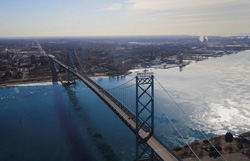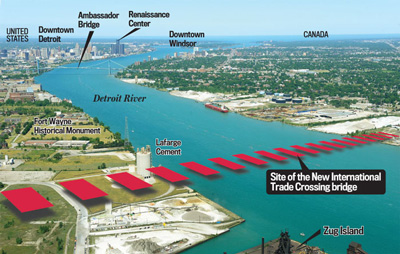U.S. Approves Second Detroit-to-Canada Bridge
Daily News Article — Posted on April 24, 2013

The Ambassador Bridge, a 7,500-foot suspension bridge, first linked the United States and Canada in November 1929. It is a primary route for auto suppliers and the busiest international border crossing in North America in terms of trade volume. (Detroit News)
(by Matthew Dolan, The Wall Street Journal) DETROIT – A proposed bridge connecting Detroit and Canada at the nation’s busiest commercial trade crossing received [approval from] the Obama administration Friday, April 12.
The approval from the U.S. State Department eases the way for a second span across the Detroit River that could relieve truck congestion and spur more trade at the critical U.S.-Canada border crossing, supporters said.
But the project still faces potential roadblocks in court. In February, state Rep. Fred Durhal, a Democrat from Detroit, filed suit against Michigan Gov. Rick Snyder, claiming the governor can’t sign an agreement with Canada without legislative approval. The bridge also faces legal challenges from the owner of the sole existing span between Detroit and Windsor, Ontario.
A new bridge could be completed as soon as 2020 if the legal obstacles were cleared away, Mr. Snyder said Friday. The estimated cost of the bridge is $950 million, with millions more to be spent on land acquisition and construction of links to existing highways.
Mr. Snyder has said Canada, not Michigan taxpayers, would bear the costs of the new span, in part through a $550 million contribution to be paid back through toll revenue.
Mr. Snyder and Canadian Prime Minister Stephen Harper signed a deal nearly a year ago that calls for Canada to pay for the new bridge after the Michigan governor failed to gain approval in his own state’s legislature. About one-quarter of all Canada-U.S. trade flows over the privately owned, 83-year-old Ambassador Bridge, the only span in Detroit that allows most truck traffic.
Canadian officials and major business organizations, including the Detroit Three auto makers, supported the second span to ease the flow of goods – including cars and auto parts. About 12,000 jobs would be created as part of the construction project, Mr. Snyder said.
Billionaire Manuel Moroun, who controls the Ambassador Bridge, has for years fought the publicly financed bridge project, which is a potential threat to his toll revenue.
Last year, Mr. Moroun pushed a ballot initiative in Michigan that would have stopped the project with a constitutional amendment. But in November, Michigan voters rejected the measure.
In February, Mr. Mouron’s bridge company filed a new complaint as part of a continuing federal lawsuit against the bridge project, claiming that the company has an exclusive right to operate its crossing without competition.
Most of the federal agencies named in the lawsuit haven’t filed responses yet. A lawyer for the company didn’t return a call for comment Friday.
First published April 12. Copyright 2013 Dow Jones & Company, Inc. All Rights Reserved. Reprinted here for educational purposes only. Visit the website at wsj.com.
Questions
1. Who is opposed to building the second bridge between Detroit and Canada, which was approved by the Obama administration recently? - For what reasons are they opposed to the construction of a second bridge?
2. What is the estimated cost to build the bridge?
3. a) Who will pay for the bridge construction?
b) How will they recoup the money they put out for bridge?
4. What percent of the trade between Canada and the U.S. currently crosses over the Ambassador Bridge?
5. a) How is a second bridge expected to benefit trade and travel?
b) Do you think a second bridge will benefit American businesses? Explain your answer.
Background
The Ambassador Bridge
- The Ambassador Bridge is a suspension bridge that connects Detroit, Michigan, in the United States, with Windsor, Ontario, in Canada.
- It is the busiest international border crossing in North America in terms of trade volume: more than 25 percent of all merchandise trade between the United States and Canada crosses the bridge.
- A 2004 Border Transportation Partnership study showed that 150,000 jobs in the region and US$13 billion in annual production depend on the Detroit-Windsor international border crossing.
- The bridge is owned by Grosse Pointe billionaire Manuel "Matty" Moroun through the Detroit International Bridge Company in the US and the Canadian Transit Company in Canada, and at one time it was publicly traded on the New York Stock Exchange.
- It is the only private ownership of a border crossing between the United States and Canada.
- The bridge is responsible for 60-70% of commercial truck traffic in the region.
- Moroun also owns the Ammex Detroit Duty Free Stores at both the bridge and the tunnel.
- It is one of the only two Canada-US border crossings where people travel North into the United States. (from wikipedia)
PROPOSED SECOND BRIDGE FROM DETROIT INTO CANADA:

